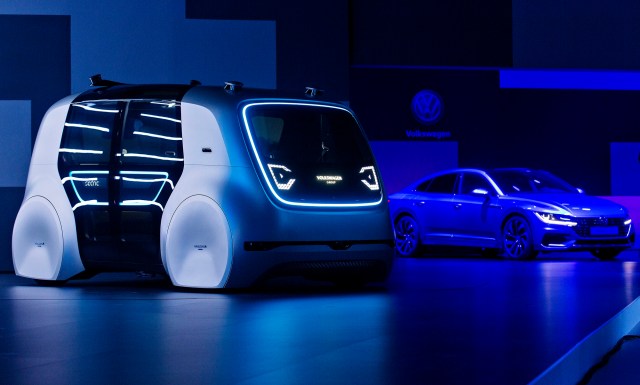Meet the Volkswagen Sedric: He’d be happy to drive you to work. Credit: CTK Photo/Petr Mlch

Why buy a new car? A good reason might be that you need a roomier car for a bigger family; a less good reason might be that you need a flashier one for a bigger ego.
But unlike some other products, you don’t get a new car because it does something fundamentally different from your old one. Sure, they’ve become more reliable; their fuel efficiency has improved; and they’re safer, too. But all these improvements are iterative or additive. You don’t get a new car because the latest models can fly, or run on water. Cars do what they’ve always done, only slightly better.
As a result, older cars aren’t rendered obsolete by the existence of newer cars – unlike, say, televisions when we made the leap from black-and-white to colour or from analogue to digital.
However, as Vlad Savov points out in the Verge, things are about to change. In the near future, otherwise roadworthy vehicles will be at risk of technological obsolescence – due to the spread of automation.
As a bit of background to his argument, you need to know that there are six progressively more complete levels of automation – from Level 0 (no automation; you’re on your own) to Level 5 (full automation; human driver not required). Savov explains that in scheduling the release of new models over the coming decade, car manufacturers fully expect to achieve higher levels of automation every few years:
“Only one problem with that: people don’t buy cars anywhere near as often as the oncoming cascade of upgrades will arrive, and if each of those requires us to buy a new car, there’ll be a great deal of discontent.”
For instance, how will you feel when your shiny new Level 3 car (partial automation; autopilot and auto parking, but driver must be ready to assume control) is left in the dust by your neighbour’s Level 4 pride-and-joy (high automation; occasional driver intervention required, but the car will cope if it doesn’t get it):
“Even conservative companies like Honda are planning to have Level 4 self-driving cars out on the road by 2025…”
This really doesn’t leave much time for the Level 3 cars due to hit the market before 2020.
But why does this matter? Products like mobile phones and computers are never the latest thing for very long. Indeed, consumers have come to expect that the more ‘intelligent’ a product, the more likely it is to become obsolescently stupid within a decade. With cars, though, it does matter – and for a rather basic reason:
“The big difference with cars, versus other forms of rapidly evolving technology, is in how much they cost and how often we buy them…
“…Imagine all the angst you might experience when finding out your Android phone will no longer be updated to the latest version, and then multiply that by the cost of a shiny new car.”
Savov believes that car manufacturers have yet to realise just how unpopular this will be:
“…they’re narrowly focused on making the technology work, paying little heed to its broader effects. Externalities like pissing off existing customers by rapidly obsoleting the car they just bought don’t seem to have been taken into account.”
This, I think, will turn into a huge political controversy was well as a commercial one. If governments want to secure full benefit of self-driving car technology – especially the elimination of accidents and congestion – human driver error will have to be removed from all cars not just some cars. Technology will allow drivers to let go of the wheel, but it will take politics to make them do so.
This won’t happen all in one go or in the same way everywhere. Different jurisdictions will experiment with different regulatory regimes – specifying when and where computer control is mandatory. But as vehicle automation technology becomes more and more advanced, human input will be less and less tolerated – meaning that cars with inadequate levels of automation will be banned from the road.
Some very difficult political decisions will need to be made and a lot of people are going to be furious. There is, however, a long-term solution – which is for the public to give up on vehicle ownership altogether. In a future where we can use our smartphones to summon a ride whenever and wherever we need one, why bother with owning, insuring, maintaining and parking something as big and expensive as a car? Indeed, why commit to any particular vehicle when our transport needs vary from day to day? A fully automated car is basically a driverless taxi, so it makes sense for specialist firms to handle the purchasing and servicing of entire fleets.
If, or rather when, automation becomes a big political issue, the antidote to its toxification will be taxification.










Join the discussion
Join like minded readers that support our journalism by becoming a paid subscriber
To join the discussion in the comments, become a paid subscriber.
Join like minded readers that support our journalism, read unlimited articles and enjoy other subscriber-only benefits.
Subscribe